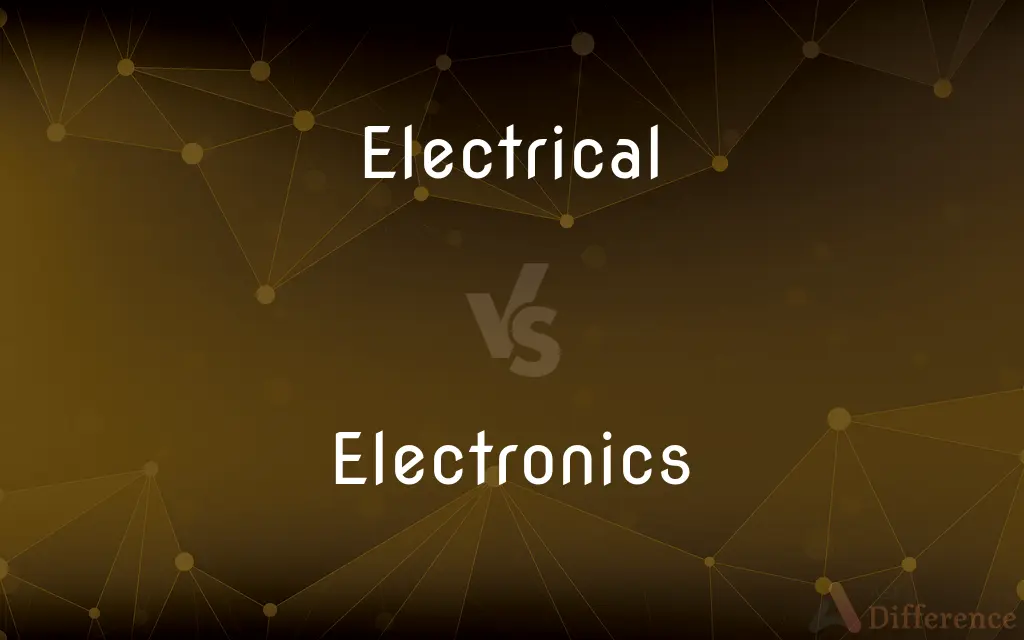Electrical vs. Electronics — What's the Difference?
By Tayyaba Rehman — Updated on September 23, 2023
Electrical pertains to the flow and design of electric currents; electronics focuses on devices using electrical circuits. The former is about power; the latter, control.

Difference Between Electrical and Electronics
Table of Contents
ADVERTISEMENT
Key Differences
Electrical, as a term, fundamentally revolves around the principles of electricity, which encompasses the design and analysis of systems that generate, distribute, and convert electrical energy. For instance, the power systems we use in our homes or industries are largely based on electrical principles. The domain of electrical engineering primarily deals with high-power applications like motor control, power generation, and transmission.
Electronics, on the other hand, delves into the design and study of systems and devices that use electrical circuits. It works on a much smaller scale, focusing on low-power applications. The domain primarily concerns itself with the behavior and movement of electrons in semiconductor devices and circuits, which form the backbone of modern computing and communication devices.
While electrical systems are commonly seen in applications requiring raw power, such as turning the motors in large machines or lighting up entire buildings, electronics are usually at play in devices requiring finesse and control. Think of smartphones, televisions, or laptops that need intricate circuitry to function as intended.
Interestingly, the demarcation between electrical and electronics isn't always sharp. For instance, a power supply unit (PSU) in a computer needs both electrical principles (for power conversion) and electronics (for control mechanisms). Nonetheless, the distinction is clear in their foundational principles: electrical deals with broader systems for power transmission, and electronics handles the intricacies of devices.
Comparison Chart
Focus
Flow and design of electric currents
Devices using electrical circuits
ADVERTISEMENT
Scale
Larger scale, high-power applications
Smaller scale, low-power applications
Domain
Power generation, distribution, conversion
Semiconductor devices, circuits, control systems
Applications
Motors, power grids, transformers
Smartphones, TVs, computers
Foundational Principles
Principles of electricity and power
Behavior and movement of electrons
Compare with Definitions
Electrical
Related to power generation, distribution, and conversion.
Electrical engineering students learn about power grids.
Electronics
Pertaining to devices that control the flow of electrons.
The world of electronics has transformed communication.
Electrical
Pertaining to electricity and its applications.
The electrical system in our house is outdated.
Electronics
Involving intricate circuitry for control and function.
Electronics repair requires precision and patience.
Electrical
Based on principles of electric energy.
The electrical storm caused a power outage.
Electronics
Relating to semiconductor devices and their application.
Modern electronics rely heavily on miniaturized components.
Electrical
Concerned with large-scale energy systems.
He fixed the electrical fault in the main line.
Electronics
Based on principles of electron behavior in materials.
The electronics in this gadget are cutting-edge.
Electrical
Concerned with, operating by, or producing electricity
Electrical appliances
Electronics
Concerned with devices using electric circuits.
He's studying electronics engineering at college.
Electrical
Electrical equipment or circuitry.
Electronics
Electronics comprises the physics, engineering, technology and applications that deal with the emission, flow and control of electrons in vacuum and matter. It uses active devices to control electron flow by amplification and rectification, which distinguishes it from classical electrical engineering which uses passive effects such as resistance, capacitance and inductance to control current flow.
Electrical
Also e·lec·tri·cal (-trĭ-kəl) Of, relating to, producing, or operated by electricity
Electric current.
An electrical device.
Electronics
(used with a sing. verb) The science and technology of electronic phenomena.
Electrical
Of or related to sound created or altered by an electrical or electronic device.
Electronics
(used with a pl. verb) Electronic devices and systems
The electronics aboard the new aircraft are very sophisticated.
Electrical
Amplified by an electronic device
An electric guitar.
Electronics
(physics) The study and use of electrical devices that operate by controlling the flow of electrons or other electrically charged particles or by converting the flow of charged particles to or from other forms of energy.
Electronics is a popular subject.
Electrical
Emotionally exciting; thrilling
An electric reading of the play.
Electronics
(in the plural) A device or devices which require the flow of electrons through conductors and semiconductors in order to perform their function; devices that operate on electrical power (battery or outlet)
Electrical
Exceptionally tense; highly charged with emotion
An atmosphere electric with suspicion.
Electronics
Electronic circuitry.
The electronics is the difference between a modern and an old-fashion thermostat.
The electronics are completely updated.
Electrical
An electrically powered machine or vehicle
Our mower is an electric.
Electronics
The branch of physics that deals with the behavior of electrons. Electronics is primarily concerned with phenomena other than simple conduction, such as emission of electrons, storage of electrical charge, the effects of electrical fields on the conduction of electrons through a circuit, and amplification and manipulation of electric signals such as voltage or current by design of circuits. Electronics also encompasses the application of such fundamental principles to the construction of devices using the manipulation of electrons in their operation, known as electronic devices.
Electrical
Related to electricity (or electronics)
Electronics
The branch of engineering concerned with design of devices using the principles of electronics, for practical purposes.
Electrical
An electrical engineer.
Electronics
Electronic devices generally, or the electronic circuits within an electronic device.
Electrical
Relating to or concerned with electricity;
An electrical engineer
Electrical and mechanical engineering industries
Electronics
The branch of physics that deals with the emission and effects of electrons and with the use of electronic devices
Electrical
Using or providing or producing or transmitting or operated by electricity;
Electric current
Electric wiring
Electrical appliances
An electrical storm
Electrical
Involving electric currents and voltages.
Electrical appliances need proper grounding.
Common Curiosities
Which is more focused on high power: electrical or electronics?
Electrical is more oriented towards high-power applications.
Can an object be both electrical and electronic?
Certainly, many devices, like some appliances, have both electrical and electronic components.
Is electronics a subset of electrical engineering?
Historically, yes, but today they're distinct fields with overlapping areas.
Do electrical engineers work with power grids?
Yes, electrical engineers often deal with power generation and distribution.
Is a light bulb an example of an electrical device?
Yes, a light bulb operates based on electrical principles.
Which is more concerned with voltage: electrical or electronics?
Both deal with voltage, but electrical often involves higher voltages.
Are computers a product of electronics?
Yes, computers are based on electronic circuits and components.
Are transistors key components in electronics?
Yes, transistors are fundamental in modern electronic devices.
Is a TV remote an electronic device?
Yes, a TV remote is an electronic device controlling the TV's functions.
What do electrical systems primarily distribute?
Electrical systems primarily distribute electric power.
Are smartphones considered electronic devices?
Absolutely, smartphones are prime examples of modern electronics.
Which field deals with microprocessors: electrical or electronics?
Microprocessors fall under the domain of electronics.
Can electronics be involved in renewable energy systems?
Yes, electronics play a role in control and optimization of renewable systems.
Do electrical engineers work on designing circuits?
While they can, intricate circuit design is usually the realm of electronics.
Share Your Discovery

Previous Comparison
Naval vs. Navel
Next Comparison
Tornado vs. CycloneAuthor Spotlight
Written by
Tayyaba RehmanTayyaba Rehman is a distinguished writer, currently serving as a primary contributor to askdifference.com. As a researcher in semantics and etymology, Tayyaba's passion for the complexity of languages and their distinctions has found a perfect home on the platform. Tayyaba delves into the intricacies of language, distinguishing between commonly confused words and phrases, thereby providing clarity for readers worldwide.
















































